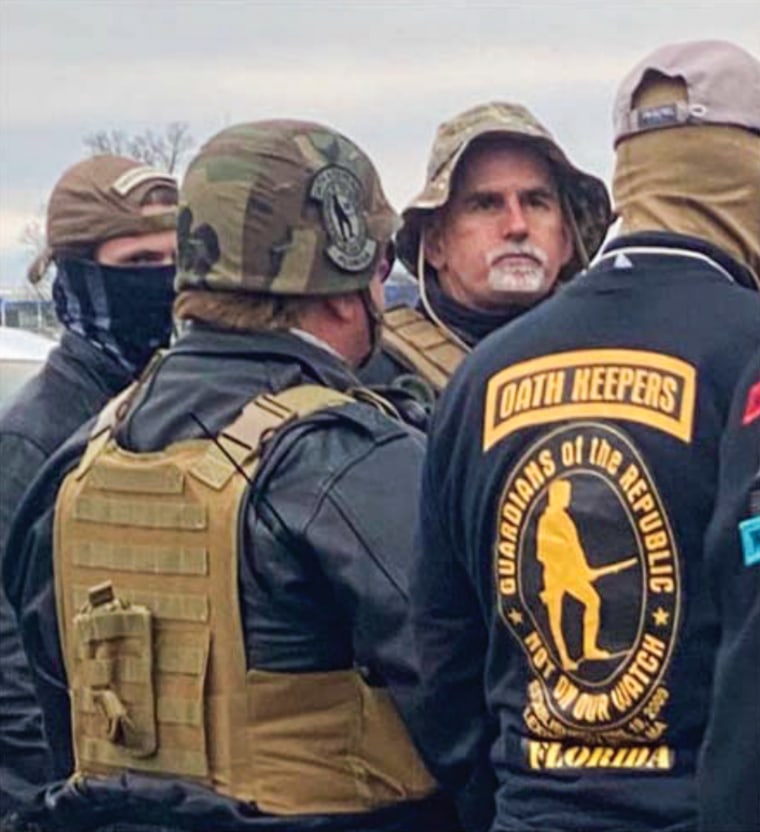WASHINGTON — A member of the Oath Keepers convicted in connection with the Jan. 6 riot wanted to be a part of the attack on the Capitol because he thought it was similar to the 1789 storming of the Bastille, he said in courtroom testimony against other members of the far-right group Monday.
“I felt it was like a Bastille-type moment in history," Graydon Young told jurors in the seditious conspiracy trial of Oath Keepers founder Stewart Rhodes and four other members of the organization. “I thought that I participated in something that was potentially a historically significant event."
Insurgents seized the Bastille, a fortress and political prison that represented royal authority in Paris, on July 14, 1789. July 14, known as Bastille Day, is a national holiday in France.
Young, who pleaded guilty to criminal conspiracy and obstruction of Congress and agreed to cooperate with the government, said during the trial's fifth week of testimony that there was "pandemonium" inside the Capitol when he entered on Jan. 6, 2021. “It was crazy,” he said.

Young, 57, described how he felt "desperation and hopelessness" after President Donald Trump lost the 2020 presidential election. He said he "listened to what Trump’s attorneys were saying" about the election and got sucked into conspiracy theories online.
“Unfortunately, I was spending way too much time on YouTube and Facebook,” Young testified. He also said he went back and forth about whether he wanted to come to Washington on Jan. 6 because he thought that more than a traditional protest was needed and that picketing wasn't going to bring about any change.
"I thought protests were a waste of time, and they don’t achieve anything,” Young testified.
Young, a Navy reservist for more than a decade before the 2020 election, said that by fall 2020 he was helping his wife run a small preschool and managing some rental properties. He said he had a lot of free time, during which he closely followed the election.
On Jan. 6, Young testified, he was with his sister Laura Steele, who has pleaded not guilty in connection with the Jan. 6 attack. He later joined a group that rushed to the Capitol after he heard it had been breached, he said in court.
“Obviously, all of us were aware of what was going on in the building,” Young said. “I wanted to have some kind of an impact on that and change what was happening.”
Young went on to testify that once the Oath Keepers went back outside after they stormed the building, they talked about what kind of protection the police officers had — including the type of body armor they wore — and spoke about how they wished they’d brought gas masks to counter the tear gas used by police.
“If we had been more geared up and prepared, we might have been able to get through the police barrier,” Young said they discussed.
Later, he posted on Facebook: “We stormed and got inside.”
Capitol Police Officer Harry Dunn testified earlier in the day that Oath Keepers didn’t assist him during the Jan. 6 attack when he was guarding a staircase and that the most helpful thing the rioters could have done was to leave.
Young said that he now feels "extremely ashamed and embarrassed" about what he did but that at the time "I didn’t feel bad about it.”
He also became emotional as he discussed his guilty plea.
“I hope the government will take into account I’m really sorry for what I did,” he said, choking up. U.S. District Judge Amit Mehta handed Young a tissue box, and he paused for a moment to collect himself.
“To be forgiven, you have to confess,” Young said. “I felt like I needed to confess completely and wholly.”
He said later, "I guess I was acting like a traitor against my own government."
The government is expected to call more witnesses this week before it rests its case. Rhodes is expected to testify in his own behalf when the defense presents its case.
